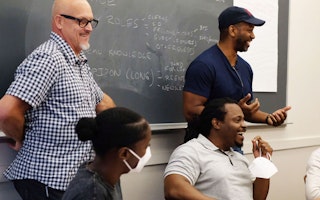NEW YORK—The Open Society Foundations today announced the global launch of The Ideas Letter, an online magazine and newsletter that delivers political and cultural perspectives to readers who are open to the unconventional.
“The mission of The Ideas Letter is to provide readers with contributions from across ideological and intellectual aisles, from a range of disciplines, intended to bolster debate around issues of consequence,” said Leonard Benardo, senior vice president of the Open Society Foundations.
“By offering a diverse array of voices, we want to engage an audience interested in gaining a deeper understanding of the complex forces at play in our society and globally—a core component of Open Society’s mission and ethos.”
The Ideas Letter is the first project of its kind to be launched by Open Society. It is now available without charge on a dedicated website and as an email newsletter, following an initial soft launch on Substack in October last year.
Early issues of The Ideas Letter have explored topics such as workers’ disenchantment with social democracy; anti-imperialist excuses for authoritarianism in Tunisia; and the enduring, cosmopolitan allure of the New York Intellectuals, a group of left-wing American writers and literary critics based in New York City in the mid-20th century.
The Ideas Letter has featured unique, commissioned pieces from authors including the late Gary Indiana from the United States, who examined the intersections of culture and politics; Guardian writer Nesrine Malik, who provided a sharp critique of the Save Darfur movement and Sudan today; and Isabella Weber on disaster capitalism.
Each issue also contains a carefully curated collection of pieces sourced from a wide array of publications including magazines, podcasts, journals, and videos. While all are in English, The Ideas Letter features translated pieces from all over the world.
“No one person or institution has a monopoly on the truth, and that is why The Ideas Letter is so crucial. It promotes diverse perspectives, some of which we may not agree with, but always ones that seek to challenge our thinking,” said Binaifer Nowrojee, president of the Open Society Foundations.
By moving to a dedicated website, the accessibility and engagement of readers will be enhanced, enabling these discussions to reach a broader audience.
Today’s 28th issue is a special edition, entitled “America in Decline?” It brings together 10 distinguished writers from around the globe to examine one central question—whether America is truly in decline or undergoing a creative transformation.
Some of the contributions include:
- Natalia Saltalamacchia from Mexico, exploring America’s declining influence in Latin America
- Kirill Rogov from Russia, offering a critical perspective on American geopolitical strategies
- Ursula Lindsey on the Middle East, discussing the cultural and political perceptions of America in the region
- Basharat Peer on the love/hate relationship India has with American power
- Iza Ding analyzing the concept of decline from a Chinese perspective
- Cheta Nwanze discussing how multipolarity in global politics affects Africa, highlighting the continent’s changing relationships with major powers
- Hans Kundnani from Europe, and the continent’s ambivalence about America’s decline
To read all the essays in the “America in Decline?” issue and subscribe, visit theideasletter.org.
Contributors for the “America in Decline?” issue:
Iza Ding is an associate professor of political science at Northwestern University and the author of The Performative State (Cornell University Press, 2022). She is spending the 2024–25 academic year in the fall as an Ellen Maria Gorrissen Fellow at the American Academy in Berlin and in the spring at the Hertie School of Governance.
Ursula Lindsey is a reporter, essayist, and book reviewer who largely writes about North Africa and the Middle East, where she has lived for the last two decades. After living in Egypt and Morocco, she is now based in Amman, Jordan. She is a frequent contributor to The New York Review of Books and a co-host of the BULAQ podcast, which focuses on Arabic literature in translation.
Fernanda Magnotta, Ph.D. in International Relations, is a professor and U.S. policy expert who heads the International Relations Program at FAAP (São Paulo) and serves as senior fellow at CEBRI and Global Fellow at the Wilson Center. She is a regular media contributor and project leader connecting Brazil-U.S. stakeholders.
Cheta Nwanze is a researcher who specializes in politics and the economy. He works with SBM Intelligence, a Nigerian think tank that is focused on West Africa and its relationship with the world.
Basharat Peer is the author of Curfewed Night, a memoir about the conflict in Kashmir, and A Question of Order: India, Turkey and the Return of Strongmen. He has written for The New York Times, The New Yorker, Granta, Foreign Affairs, The Guardian, and n+1. He worked as an international opinion editor at The New York Times and currently works at the International Crisis Group as deputy director for its Future of Conflict Program.
Kirill Rogov is a well-known expert on Russian politics and the economy, who left the country following the full-scale invasion, is living in Vienna, and has launched Re: Russia–Expertise, Analysis and Policy Network, providing in-depth analysis of Russian politics and economic development.
Natalia Saltalamacchia is chair of the Department of International Studies at the Instituto Tecnológico Autónomo de México. She served as general director of the Matías Romero Institute, Mexico's diplomatic academy, at the Ministry of Foreign Affairs between 2015 and 2018.
Lee Siegel publishes widely on politics and culture and is the recipient of a National Magazine Award. His eighth book, Nothing Alien: Writings 1989–2024, will be out next May.
Hans Kundnani is an adjunct professor at New York University and a visiting professor in practice at the London School of Economics. He was previously the director of the Europe Programme at the Royal Institute of International Affairs (Chatham House) in London and is the author of Eurowhiteness. Culture, Empire and Race in the European Project (2023).
Stephen M. Walt is the Robert and Renee Belfer Professor of International Affairs at Harvard University.
